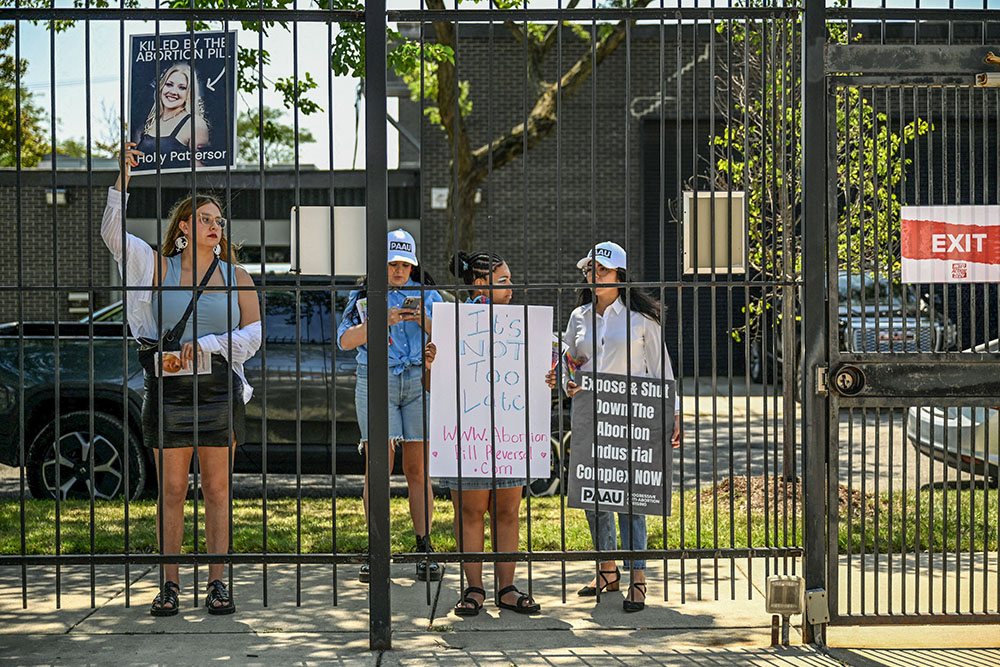
A pro-life protester and a supporter of legal abortion argue outside the Arizona State Capitol in Phoenix as the state Senate votes to repeal its near total ban on abortion May 1. (OSV News/Reuters/Liliana Salgado)
For some Catholics, a key factor in voting decisions is whether a candidate will support the enactment of laws prohibiting abortion. But are these laws themselves moral according to the teachings of the Catholic Church? Even if a person strongly believes that abortion is immoral, conscientious Catholics should be asking themselves whether these are morally acceptable laws.
Humans don't always make good laws, which is why the Catechism of the Catholic Church teaches that every one of a society's laws must be tested to be sure that it "seeks the common good of the group concerned" and "employs morally licit means to attain it."
Catholic teaching has long held that the immorality of an act is not itself a sufficient reason for acts of that kind to be punishable under the law. Therefore, when discussing legal punishment for deliberate acts of abortion, the catechism specifies that the punishment must be appropriate: "As a consequence of the respect and protection which must be ensured for the unborn child from the moment of conception, the law must provide appropriate penal sanctions for every deliberate violation of the child's rights."
The catechism does not provide a detailed test for determining if a law is morally justifiable, but Thomas Aquinas identifies three conditions that every human law must fulfill in order to further the common good and be morally acceptable. Every proposed law, he explains, must dependably:
- Remove the evil the law is intended to remove;
- Further the good the law is intended to further;
- Prevent "any harm ensuing from the law itself."
A careful examination of laws prohibiting abortion, like those that have been passed since the Supreme Court's decision in Dobbs, suggests they do not meet the criteria for moral laws as defined by Aquinas and supported by Catholic teaching.
Criterion 1
None of the state laws prohibiting abortion passed since Dobbs prescribe punishment for women who have had an abortion or are seeking to do so. Instead, it is physicians or others who perform or assist in abortions whom these laws punish. Therefore, it is laws punishing physicians that need to be examined, and the first question to ask about the morality of such laws is whether they will dependably reduce the number of abortions.

Pro-life protesters hold placards outside of a Planned Parenthood mobile clinic nearby the United Center, the host venue of the Democratic National Convention in Chicago Aug. 19. (OSV News/Reuters/Vincent Alban)
The penalties such laws prescribe for physicians who perform abortions — loss of medical license, severe financial penalties, jail time — are certainly serious enough to deter most physicians who might otherwise be available to perform abortions.
But women have been able to end pregnancies for hundreds of years without involving a physician, although often with significant risk to themselves. In addition, biological abortifacients are now widely available, and women who have the means can travel to a state where abortion services are legal if the state where they live prohibits them. These realities raise the question whether such laws will dependably reduce the number of abortions.
Criterion 2
These laws can only further the good of the lives and health of children if the number of abortions is in fact significantly reduced. Laws punishing abortions already performed do nothing to positively enhance the health of those children.
In fact, there are other nations that have lower abortion rates than the United States, even though these nations do not have laws prohibiting and punishing abortions. What they do have are accessible prenatal and perinatal care and laws making sure that there will be adequate food, housing, income, skilled child care and dependable education as children grow and develop.
In addition, in order to significantly reduce the number of abortions, states having such laws will need to establish means of enforcing them. Legal authorities will need to know when and by whom the relevant actions have occurred. It will be necessary for law enforcement authorities to investigate every incident labeled a miscarriage or, at the extreme, to determine the content of every visit to a physician by a pregnancy-capable person.
Advertisement
The reach of law enforcement into people's private lives is, for good reasons, necessarily limited in any democratic society. It is doubtful that our society would tolerate routine invasions of privacy like this. But without such invasive mechanisms of enforcement, laws punishing physicians who perform abortions would be even less likely to dependably eliminate future abortions.
The likelihood that such laws will not significantly reduce the number of abortions should give supporters of such laws serious reasons to examine their morality more carefully, especially if these laws also fail to dependably prevent serious "harm ensuing from the law itself."
Criterion 3
One serious negative effect of laws passed since Dobbs that prohibit abortion and punish physicians is that many women in states having these laws who need emergency obstetric care because of the nature of their pregnancies or the condition of their fetuses have become unable to get it.
Another, equally serious negative effect of laws prohibiting abortion is that they will almost certainly result in many people being punished who are not guilty of the relevant evil. Any law that mistakenly punishes people who are not guilty is surely causing harm.
The reason for this is Catholic teaching about conscience is clear in the catechism, which states, "A human being must always obey the certain judgment of his conscience." That is why when a person has carefully formed their conscience regarding what morality requires, the catechism claims, "Man has the right to act in conscience and in freedom so as personally to make moral decisions. 'He must not be forced to act contrary to his conscience. Nor must he be prevented from acting according to his conscience, especially in religious matters.' "
Some people, though they may consider abortion to be an important moral matter because they consider the lives of fetuses valuable, may nevertheless consider other aspects of a situation to be of sufficient moral importance to outweigh these considerations. Contrary to the catechism's teaching that "from the first moment of his existence, a human being must be recognized as having the rights of a person," they may not believe a fetus has the rights of a full human person.

People celebrate the defeat of Issue 1, a Republican-backed measure that would have made it harder to amend the state constitution, an initiative aimed at helping defeat a November referendum that would protect abortion access in the state, after early results were announced during an election night party at the Columbus Fire Fighters Local 67 in Columbus, Ohio, U.S. August 8, 2023. (OSV News/USA Today Network via Reuters/Adam Cairns)
Therefore, they may form their consciences about abortion from a different point of view. They may consider abortion to be a serious moral matter, a clear and possibly tragic harm to a member of the human family, but not the violation of human rights that the Catholic Church sees in such an act.
Catholic teaching about conscience is clear that if a person has carefully formed their conscience about the morality of an act and chooses an immoral action because they sincerely believe it is the moral thing to do, this is a forgivable failing.
"One commits venial sin when, in a less serious matter, he does not observe the standard prescribed by the moral law, or when he disobeys the moral law in a grave matter, but without full knowledge or without complete consent," says the catechism. "Unintentional ignorance," the catechism states clearly, "can diminish or even remove the imputability [i.e., responsibility] of a grave offense."
It is almost certain that laws prohibiting abortion would punish physicians performing abortions or other persons falling under such laws' prohibitions who have acted in good conscience and who, in accord with Catholic teaching about conscience, are therefore not guilty of grave moral wrongs. Laws that would mistakenly punish persons who, according to Catholic teaching, have acted as they morally should are surely failing to prevent "harm ensuing from the law itself."
Catholics for whom concern about abortion impacts their vote in the upcoming election and Catholics who have supported the laws prohibiting abortion that have been passed since Dobbs have a serious duty to consider whether these are moral laws.
If these laws fail the tests offered by Aquinas and supported by Catholic teaching, then conscientious Catholics who are opposed to abortion should determine who to vote for on the basis of whether these candidates will support the life and dignity of every individual throughout their lives, and not whether they support laws that by this measure, should be considered morally defective.
Editor's note: For a more extensive critique of laws prohibiting abortion using Thomas Aquinas' three criteria, see "Should Catholics Support Laws Prohibiting Abortion?" published in New Blackfriars by Cambridge University Press.








